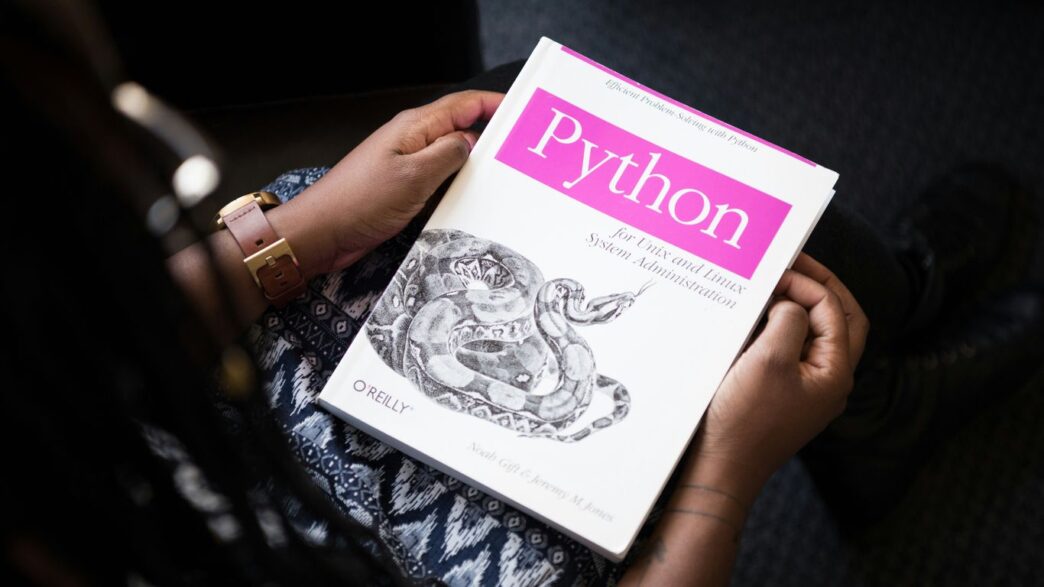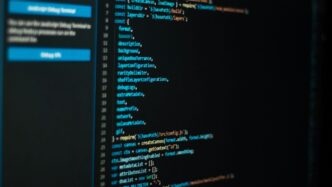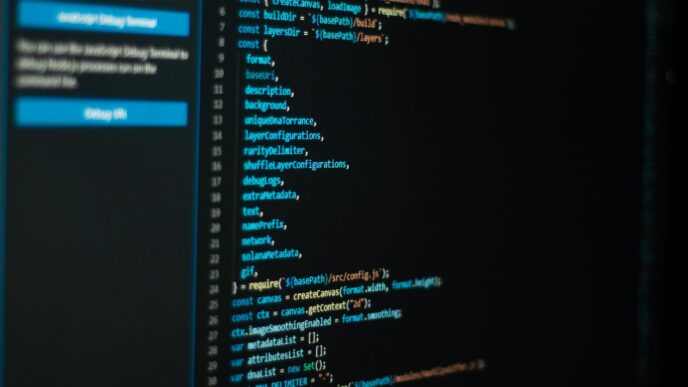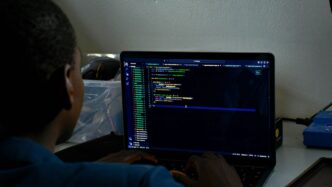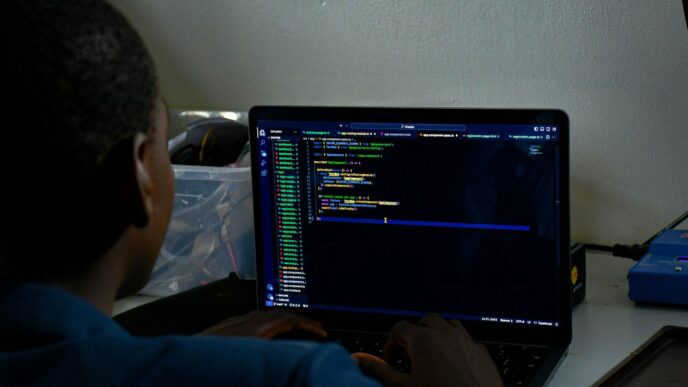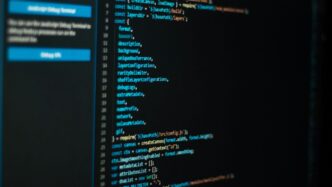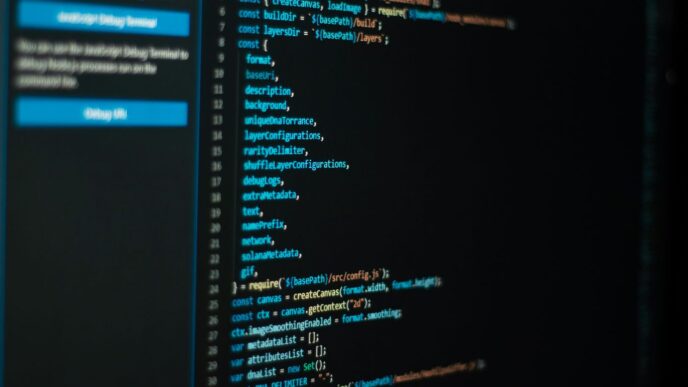Thinking about learning Python? It’s a great choice, honestly. Python is used everywhere these days, from websites to smart computers. And guess what? You don’t need to spend a fortune to get good at it. freeCodeCamp has put together some really solid stuff that can help you go from knowing nothing to actually building things with Python. We’ll look at what they offer and how you can make the most of it.
Key Takeaways
- freeCodeCamp provides a wide range of free resources for learning Python, suitable for all skill levels.
- Their learning paths cover everything from basic Python syntax to advanced topics like data science and AI.
- Hands-on projects and coding challenges are a big part of the freeCodeCamp approach to learning Python.
- You can connect with a large community for support and get recognized with certifications.
- Learning freeCodeCamp python can open doors to new career opportunities.
Mastering Python with freeCodeCamp’s Extensive Resources
So, you want to learn Python? That’s a smart move. Python is everywhere these days, from building websites to crunching data and even powering AI. It’s a language that’s both powerful and, honestly, pretty approachable once you get the hang of it. And the best part? You don’t need to spend a fortune to get started. freeCodeCamp has put together some seriously good stuff to help you learn Python, and it’s all free.
Introduction to freeCodeCamp’s Python Offerings
freeCodeCamp isn’t just a website; it’s become a go-to spot for learning to code. When it comes to Python, they’ve got a whole collection of resources. Think of it like a digital toolbox packed with everything you might need. They offer video courses, articles that break down complex ideas, and interactive lessons where you can actually write code right in your browser. They even have daily coding challenges to keep your skills sharp. It’s a pretty solid setup for anyone looking to get into Python, whether you’re starting from scratch or looking to level up.
Why Choose freeCodeCamp for Python Learning
Okay, so why freeCodeCamp specifically for Python? For starters, it’s completely free. No hidden fees, no subscriptions you forget to cancel. You get access to a ton of material without opening your wallet. Plus, their approach is really hands-on. They don’t just talk about coding; they get you doing it. This is super important because you really only learn to code by coding. They also have a massive community, which is a big deal when you get stuck – and you will get stuck, we all do. Having a place to ask questions and get help from others who are also learning or already know Python makes a huge difference. It’s a great way to get started with Python programming.
Navigating freeCodeCamp’s Learning Paths
freeCodeCamp organizes its Python content into clear learning paths. This means you’re not just jumping around randomly. They guide you step-by-step, starting with the absolute basics and moving towards more advanced topics. You can think of these paths like a roadmap for your Python journey. They usually start with simple concepts like variables and data types, then move into things like loops, functions, and eventually more complex areas like web development or data science with Python. It’s designed to build your knowledge logically, so you’re not overwhelmed. You can follow along, complete the exercises, and feel like you’re actually making progress.
Foundational Python Concepts Through freeCodeCamp
freeCodeCamp really shines when it comes to getting you started with Python. They break down the initial hurdles that can make programming seem intimidating. You’ll start with the absolute basics, like what a variable is and how to make your computer do simple math. It’s not just about reading; you’ll actually write code right away.
Understanding Python Basics with freeCodeCamp
When you first start with Python, it can feel like learning a new language, and in a way, you are. freeCodeCamp’s approach makes this process much smoother. They focus on the core ideas you need to get going.
- Variables and Data Types: Learning how to store information, whether it’s numbers, text, or true/false values.
- Basic Operators: How to add, subtract, compare, and manipulate data.
- Control Flow: Making decisions in your code using
ifandelsestatements, so your program can react to different situations. - Loops: Repeating actions efficiently with
forandwhileloops, which is super handy for tasks you need to do many times.
Interactive Learning for Core Syntax
Syntax is like the grammar of Python. Mess it up, and your code won’t run. freeCodeCamp’s courses often have interactive elements where you can type code directly in your browser and see the results immediately. This hands-on practice is key. You’ll learn things like:
- How to write functions to organize your code.
- The correct way to indent lines, which is really important in Python.
- How to handle errors when things go wrong.
This immediate feedback loop helps you catch mistakes early and build confidence. It’s a lot more effective than just reading about syntax rules.
Building Blocks of Python Programming
Once you’ve got the basics down, freeCodeCamp guides you into slightly more complex ideas that are still considered foundational. These are the pieces you’ll use over and over again as you build bigger programs.
- Lists and Dictionaries: Learning to work with collections of data, like a shopping list or a contact book.
- File Handling: Reading from and writing to files on your computer, which is useful for saving data or processing information from text files.
- Basic Object-Oriented Concepts: Getting introduced to the idea of objects, which helps in organizing larger codebases, though this might be touched on lightly at the foundational stage.
Advanced Python Skills with freeCodeCamp’s Guidance
Once you’ve got a handle on the basics, freeCodeCamp doesn’t stop there. They guide you into the more complex and exciting areas of Python programming. This is where you start to build serious skills that employers look for.
Exploring Data Structures and Algorithms
Data structures and algorithms are like the engine and steering wheel of efficient programming. freeCodeCamp’s resources help you understand how to organize data effectively (structures) and how to solve problems with step-by-step instructions (algorithms). You’ll learn about things like lists, dictionaries, stacks, and queues, and how to use them to make your code run faster and smoother. This knowledge is super important for tackling tough coding challenges and technical interviews. They often present these concepts through coding exercises that make you think and apply what you’ve learned right away.
Web Development with Python Frameworks
Python is a big player in web development, and freeCodeCamp shows you how. You’ll get introduced to popular frameworks like Flask or Django. These frameworks provide a structure that makes building websites and web applications much easier. Instead of writing everything from scratch, you use these tools to handle common tasks, letting you focus on the unique parts of your project. You’ll learn how to set up a basic web server, handle user requests, and connect your Python code to databases.
Machine Learning and AI with Python
This is where Python really shines for many people. freeCodeCamp offers paths that introduce you to the world of machine learning and artificial intelligence. You’ll learn about libraries like NumPy and Pandas for data manipulation, and Scikit-learn for building machine learning models. The courses break down complex ideas like supervised and unsupervised learning, helping you understand how computers can learn from data. It’s a fascinating area, and freeCodeCamp provides a solid starting point to explore it.
Practical Application and Project-Based Learning
Alright, so you’ve been going through the lessons, maybe you’ve got a handle on the basics. That’s great! But honestly, just reading about Python isn’t going to make you a coder. You’ve got to actually do the stuff. freeCodeCamp really gets this, which is why they push so hard on actually building things.
Hands-On Coding Challenges
Think of these like little puzzles. They’re not just random problems; they’re designed to make you think like a programmer. You’ll run into situations where you need to sort data, find patterns, or just make a program do a specific task. It’s where you start putting those syntax rules and logic you learned into action. You’ll probably get stuck sometimes – that’s totally normal. The trick is to keep trying, maybe look at a hint if you’re really stuck, and then figure out why the solution works. It’s a bit like learning to ride a bike; you’ll wobble, maybe fall, but eventually, you get the hang of it.
- Problem Solving: These challenges force you to break down bigger problems into smaller, manageable steps.
- Algorithm Practice: You’ll get familiar with common ways to solve problems, like searching or sorting.
- Debugging Skills: You’ll inevitably write code that doesn’t work right away. Figuring out what’s wrong is a huge part of learning.
Developing Real-World Python Projects
This is where things get really interesting. Forget those tiny exercises for a minute. We’re talking about building actual applications. Maybe it’s a simple script to organize files on your computer, a basic website, or even a tool to analyze some data you find online. The goal here is to take everything you’ve learned and apply it to something that could be useful. It doesn’t have to be the next big thing, but it should be something you can point to and say, ‘I made that.’ You’ll learn a ton about how different pieces of code fit together and how to manage a project from start to finish. It’s also a great way to discover what areas of Python you actually enjoy working with the most.
Building a Portfolio with freeCodeCamp
So, you’ve built a few projects. Awesome! Now, what do you do with them? This is where the portfolio comes in. Think of it as your personal showcase. It’s a collection of your best work that you can show to potential employers or collaborators. freeCodeCamp helps you organize these projects, often by having you submit them as part of their curriculum. This means you’re not just learning; you’re also creating tangible proof of your skills. Having a solid portfolio is super important because it shows you can actually do the work, not just talk about it. It’s your resume, but with actual code examples.
Community and Certification Opportunities
Learning to code can sometimes feel like a solo mission, but with freeCodeCamp, you’re never really alone. They’ve built a pretty big community around their learning materials, which is super helpful when you hit a wall or just want to share what you’ve made.
Leveraging the freeCodeCamp Community
Think of the freeCodeCamp community as your go-to spot for getting unstuck. It’s a place where you can ask questions, and chances are, someone else has already asked the same thing or can offer a fresh perspective. They have forums and a chat system where you can connect with other learners and even experienced developers. It’s not just about getting answers, though. You can also share your own projects, get feedback, and see what other people are building. This kind of interaction really helps solidify what you’re learning and keeps you motivated.
Understanding Python Certifications
While freeCodeCamp focuses on practical skills and building projects, you might be wondering about formal recognition. For Python, a well-regarded certification is the PCAP (Certified Associate in Python Programming) from the Python Institute. Getting certified can show potential employers that you’ve met a certain standard in your Python knowledge. It’s not always a requirement, but it can definitely give your resume a boost, especially when you’re starting out.
Here’s a quick look at what PCAP certification can offer:
- Validates foundational Python skills: Shows you know the basics well.
- Industry recognition: Many companies know and respect this certification.
- Boosts job prospects: Can make you stand out in a competitive job market.
Preparing for Industry Recognition
So, how do you get ready for something like the PCAP exam, or just generally prepare to show employers you know your stuff? It’s a mix of structured learning and practice. freeCodeCamp’s courses give you a solid base. To really prepare for certification or interviews, you’ll want to:
- Solidify your basics: Make sure you’re comfortable with Python syntax, data types, control flow, and functions. freeCodeCamp’s early modules are great for this.
- Practice coding challenges: Websites like LeetCode or HackerRank offer problems that mimic what you might see in technical interviews. Working through these helps you apply your knowledge.
- Build projects: This is where freeCodeCamp really shines. Creating your own projects, big or small, demonstrates your ability to use Python to solve real problems. Documenting these projects well is key for your portfolio.
The freeCodeCamp Python Learning Ecosystem
freeCodeCamp isn’t just a collection of courses; it’s a whole system designed to help you grow as a programmer. Think of it as a connected network where different parts work together to support your learning journey. It’s more than just tutorials; it’s about building skills that last and can actually help you get a job.
Synergy with Other Learning Platforms
While freeCodeCamp has a ton of its own material, it also plays well with others. You might find that a specific concept clicks better after watching a video on YouTube or reading an article elsewhere. freeCodeCamp encourages this kind of exploration. They understand that everyone learns differently, and sometimes, a different explanation or a different format is exactly what you need. It’s like having a toolbox with various tools; you pick the one that works best for the job at hand. You can find tons of expert-written tutorials on topics like web development and data science on freeCodeCamp’s programming tutorials.
Continuous Learning and Skill Enhancement
Coding isn’t a ‘learn it once and you’re done’ kind of thing. Python, especially, is always evolving. freeCodeCamp gets this. Their platform is set up so you can always come back and build on what you’ve learned. They add new content and update existing courses, meaning you can keep your skills sharp. It’s not just about getting that first certificate; it’s about staying relevant in a field that changes fast. They offer a lot of different ways to practice, too:
- Coding challenges to test your problem-solving.
- Projects that let you build real things.
- Articles and guides that explain new concepts.
Career Advancement Through Python Skills
Ultimately, most people learn to code to improve their career prospects. freeCodeCamp’s Python ecosystem is built with this in mind. The projects you complete and the skills you gain are designed to be practical. They align with what employers are looking for. Getting certified through freeCodeCamp can also be a good signal to potential employers that you’ve put in the work. It shows you’re serious about your development and have a solid foundation in Python, which is a language used everywhere from web applications to data analysis and AI.
Keep Coding!
So, you’ve seen a bunch of ways to get started with Python, all for free. From official docs and interactive lessons to video tutorials and coding challenges, there’s really something for everyone. Don’t just read about it, though. The best way to learn is by actually doing. Pick a resource that looks good to you, start coding, and don’t be afraid to look things up or ask questions. You’ve got this!
Frequently Asked Questions
What makes freeCodeCamp a good place to learn Python?
freeCodeCamp offers a ton of free stuff to help you learn Python! They have guides, videos, and even hands-on projects. It’s like having a whole bunch of teachers and practice tools all in one spot, and you don’t have to pay anything.
Can I really learn Python for free?
Absolutely! You can learn Python without spending any money. Websites like Python.org have official guides, Codecademy offers free beginner lessons, and YouTube has tons of videos. Plus, platforms like Leetcode let you practice coding problems for free.
Where should I start if I’m totally new to Python?
If you’re just starting, check out Python.org. They have official guides that are super helpful for beginners. Codecademy’s interactive lessons are also great because you can code right in your browser and get instant feedback. Watching videos from people like Corey Schafer on YouTube can also make things clearer.
How long will it take me to get good at Python?
It really depends on how much time and effort you put in. If you practice regularly, you could feel pretty comfortable with Python in about six months to a year. Start with the basics, then try building small projects to use what you’ve learned.
Do I need a certificate to get a Python job?
Not always, but a certificate can definitely give you a boost, especially when you’re first starting out. It shows employers you know your stuff. But remember, having real projects you’ve built or experience from internships is just as important, and sometimes even more so!
What are the best ways to practice my Python skills?
Practicing is key! Websites like Leetcode have lots of coding challenges that will make you a better problem-solver. Building your own projects, like a simple website or a script to automate a task, is also a fantastic way to learn and show off what you can do. You could even join coding contests!


